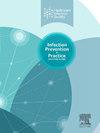A 4-year outbreak of MRSA ST72-MRSA-IV spa type t1597 in a surgical high dependency unit in Ireland linked to repeated healthcare worker recolonisation
IF 1.9
Q3 INFECTIOUS DISEASES
引用次数: 0
Abstract
Background
Patients undergoing cardiac surgery are identified as high risk for Staphylococcus aureus infection, including MRSA. An outbreak of MRSA was identified when two patients experienced MRSA infection concurrently in a cardiothoracic high dependency unit with uncommon detection of MRSA previously and an established screening programme.
Methods
An outbreak control team was convened and interventions applied including refresher training in hand and environmental hygiene, review of practice with regard to aseptic access of medical devices and consideration of antibiotic use in the unit. MRSA isolates were referred to the Irish National MRSA Reference Laboratory where spa typing assigned all isolates to t1597 and whole genome sequencing assigned them to multilocus sequence type ST72-MRSA-IV. Recovery of this strain from only this unit in Ireland and infrequent reporting in Europe prompted staff MRSA screening with two staff members found to harbour the outbreak strain. Despite successful decolonisation, recolonisation and further transmission to patients occurred.
Conclusions
In the clinical unit in which this outbreak occurred, the usual control measures to prevent spread of MRSA were in place. Recent Joint Healthcare Infection Society and Infection Prevention Society Guidance does not recommend routine staff screening for MRSA but does support its consideration in an outbreak of an unusual strain. In total, 9 patients and 2 staff were affected by this outbreak. There were 4 infections and 3 deaths. Sustained outbreak closure was necessary to protect certain national clinical programmes and was achievable only when colonised staff were no longer working in the unit.
爱尔兰一家外科高度依赖病房发生的4年MRSA ST72-MRSA-IV spa型t1597暴发与多次医护人员再定殖有关
背景:接受心脏手术的患者被认为是金黄色葡萄球菌感染的高危人群,包括MRSA。当两名患者在心胸高依赖病房同时出现MRSA感染时,确定了MRSA的爆发,之前不常见的MRSA检测和既定的筛查计划。方法召集疫情控制小组,开展手部卫生和环境卫生的进修培训,对医疗器械无菌准入的做法进行审查,并考虑在该单位使用抗生素。MRSA分离株送交爱尔兰国家MRSA参考实验室,spa分型将所有分离株鉴定为t1597,全基因组测序将其鉴定为ST72-MRSA-IV多位点序列型。这种菌株仅在爱尔兰的这个单位恢复,在欧洲很少报告,促使工作人员进行MRSA筛查,发现两名工作人员携带爆发菌株。尽管成功地去殖民化,但仍发生了再殖民化和进一步传播给患者的情况。结论在发生该病例的临床单位,预防MRSA传播的常规控制措施已到位。最近的联合卫生保健感染学会和感染预防学会指南不建议常规工作人员进行MRSA筛查,但确实支持在不寻常菌株爆发时考虑进行筛查。总共有9名病人和2名工作人员受到这次疫情的影响。有4人感染,3人死亡。为了保护某些国家临床方案,有必要持续关闭疫情,只有在被殖民的工作人员不再在该单位工作时才能实现。
本文章由计算机程序翻译,如有差异,请以英文原文为准。
求助全文
约1分钟内获得全文
求助全文
来源期刊

Infection Prevention in Practice
Medicine-Public Health, Environmental and Occupational Health
CiteScore
4.80
自引率
0.00%
发文量
58
审稿时长
61 days
 求助内容:
求助内容: 应助结果提醒方式:
应助结果提醒方式:


